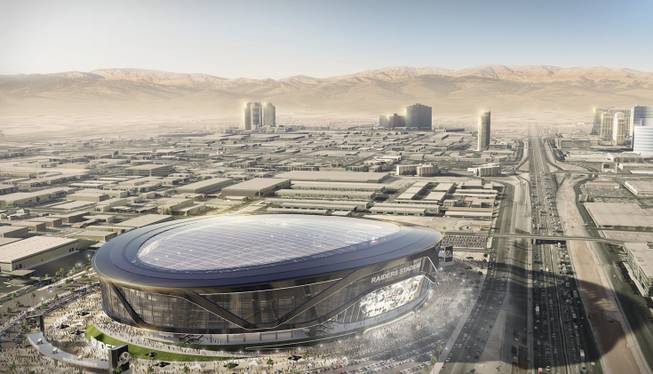
Courtesy of MANICA Architechture
An artist’s illustration of a stadium on Russell Road and Las Vegas Boulevard was revealed during a Southern Nevada Tourism Infrastructure Committee meeting at UNLV Thursday, Aug. 25, 2016.
Wednesday, Feb. 1, 2017 | 2 a.m.
Related news
- Report: Goldman Sachs balks at putting up Las Vegas stadium money
- Feeling slighted, Adelson severs ties with Raiders stadium project in Las Vegas
- 8 things to know about the proposed Raiders’ stadium lease
- Raiders submit draft lease for proposed Las Vegas stadium
- Raiders’ move to Las Vegas might not be a done deal yet
- Raiders making ‘impressive’ progress toward moving to Las Vegas
- Momentum growing within NFL for Raiders’ move to Las Vegas
Detached from the Raiders relocation drama, UNLV’s football team still has a real opportunity to play in a fancy new stadium within the next few years.
What that stadium looks like and who pays to build it, however, change dramatically depending on whether Oakland’s National Football League franchise continues with its planned move to Las Vegas after losing the $650 million commitment of Sheldon Adelson and apparently the backing of Goldman Sachs as well.
Senate Bill 1, the state legislation passed in an October special session, provides a path to a stadium partially financed by UNLV if the NFL ultimately passes on Las Vegas. That possibility remains a good distance away, though, as the law allows the Las Vegas Stadium Authority to pursue a professional team to take its $750 million in room-tax money toward building a 65,000-seat facility through the middle of 2018.
If no team accepts that deal, UNLV President Len Jessup or his successor would have three months from the expiration of an effort to attract a pro team to decide if he wants to build a stadium primarily dedicated to the Rebels. A simple "yes" does not secure any public money, as UNLV would need to raise $200 million in private funding over the next two years in order to trigger its claim in SB1.
The law authorizes a reduced public commitment of $300 million for a UNLV stadium; the tax on Strip rooms would fall from 0.88 percent to 0.375 percent, while the lodging tax on rooms in the remainder of the stadium district would drop from 0.50 percent to 0.25 percent. At least 40,000 seats would be required in a UNLV facility, per the legislation.
Jessup said in a statement that he hopes to find a new home for the Rebels with or without the Raiders.
“We would like to think that a new state-of-the-art stadium is still possible and will be the future home of UNLV football,” Jessup said.
That $200 million goal would present a major fundraising challenge for the university. In the past two years, the UNLV Foundation reported $150 million in total pledges and gifts, with a current endowment of more than $235 million as of June 2016. The foundation’s annual report showed $10.8 million in gifts and pledges to athletics for fiscal year 2015-16. The university’s first-ever capital campaign started in 2002 raised $537 million over the course of nearly eight years.
The $10 million gift from the Fertitta family to the UNLV football program in October for the construction of a training and practice facility marked the largest single donation in the history of the athletics department. UNLV Athletics Director Tina Kunzer-Murphy declined comment on the latest stadium developments through a university spokesperson.
Colorado State is building the Mountain West’s newest football facility, a 36,000-seat stadium that will cost $220 million and is scheduled to open for the 2017 season. Original plans called for half the stadium cost to be financed through private donations, but university officials later successfully lobbied the state legislature to pay for it through the sale of bonds.
The last professional football stadium built for anywhere near $500 million was University of Phoenix stadium in Glendale, Ariz., which cost $455 million but was built 11 years ago.
Should neither the NFL nor UNLV succeed in building a stadium, tax funding authorized by SB1 remains in place and goes to the Las Vegas Convention and Visitors Authority. The law already included a separate tax to help fund $1.4 billion in expansion and improvements to the Las Vegas Convention Center.

Join the Discussion:
Check this out for a full explanation of our conversion to the LiveFyre commenting system and instructions on how to sign up for an account.
Full comments policy